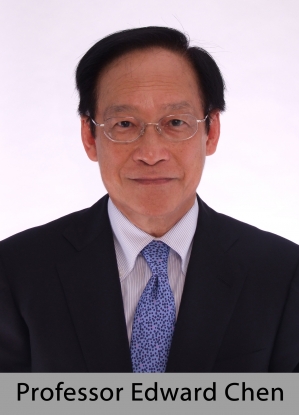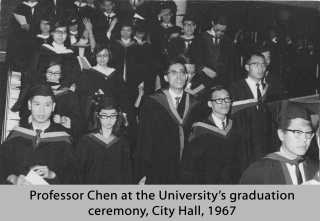Alumni
One Very Elite Family
One Very Elite Family
Admission to the University of Hong Kong used to mean more than a good education. It was entrance to a life at the top of society, where job offers rolled in and graduates could pick and choose. Students therefore liked to show off where they came from.
Professor Edward Chen  (BA 1967) remembers the University shop being stocked with jackets, ties, bags, cardigans, bookmarks, book covers and other items imprinted with the University logo, that were all flashed openly by students.
(BA 1967) remembers the University shop being stocked with jackets, ties, bags, cardigans, bookmarks, book covers and other items imprinted with the University logo, that were all flashed openly by students.
“In terms of dress it was logos everywhere,” he says. “You dressed quite properly because being University students you were very much respected. People looked up to you [because] you are HKU, you are going to be a very important person in society.”
But that elite status, plus the limited intake of only 500 students per year, made the University a difficult place to get into.
Most came from wealthy families because there were no government loans or grants, although twenty scholarships and bursaries for the entire Hong Kong were available to help the brightest students, such as Professor Chen.
He had been raised in a single-parent family and gained entrance to HKU on his own talents and hard work, earning a full scholarship and bursary for his outstanding A-level results. This was all the more remarkable because he had to switch completely from science to arts subjects in Upper Form 6 when he decided to pursue Economics rather than Medicine, in order to meet the Faculty’s requirements. “That’s how restrictive the Arts Faculty was,” he says.
Once through the University’s doors, however, school was a breeze. Students were not required to attend lectures and only had to pass their exams. “It was very difficult to get into the University but it was so easy to get out with an honours degree,” he says.
The world was a graduate’s oyster from there, but in Professor Chen’s year there was a complicating factor: the 1967 riots. Waves of people demonstrated on the streets as chaos in China spilled over the border.
One Very Elite Family
“As an Economics student there are usually many jobs waiting for you,” he says. “But in May 1967 we did not even know whether there would be an exam the next morning. There could be a curfew, the way could be blocked by pineapple bombs, anything. But to my best memory I think all my exams did take place.”
Employers were not hiring, though. His classmates struggled to find work until the end of the year when things quickly got back on track. But by then Professor Chen had decided to continue studying and thus became “an academic by default”. He earned his master’s degree at HKU (by this time Economics was in the new Faculty of Social Sciences) and PhD at Oxford, and joined the HKU academic staff, staying until 1995 when he became President of Lingnan University (then College).

One goal he brought from his HKU experiences to Lingnan was to keep student numbers low. There were only about 2,000 students in his undergraduate days. “You knew everybody at that time, if not their names then their faces,” he says. “There was a sense of community, a sense of loyalty to the University.”
Also pride. Professor Chen attended both the Golden Jubilee celebrations in 1961, when he came to watch a performance as a secondary school student, and the Centenary celebrations in 2011 when he was among the invited guests. “I was lucky to have this kind of experience,” he says.
Professor Edward K Y Chen graduated from the University of Hong Kong with a BA in Economics (1967). He was Director of the University’s Centre of Asian Studies (1979 to 1995) and President of Lingnan University (1995 to 2007). He was appointed to the Legislative Council (1991 to 1992) and the Executive Council (1992 to 1997).

